Insurmountable Obstacles in Afghanistan
My latest for The National Interest,Insurmountable Obstacles in Afghanistan, has been posted.
My latest for The National Interest, “Insurmountable Obstacles in Afghanistan,” has been posted.
In a speech to the Atlantic Council this week, Major General John Toolan, just returned from a year commanding NATO forces in southwestern Afghanistan, both highlighted the tremendous progress coalition forces have made since the beginning of the Afghan surge and candidly acknowledged how much work remains to be done.
[…]
While Toolan went out of his way to praise the toughness of the Afghan infantry soldiers and marvel at their skill at human intelligence (which apparently doesn’t extend to ferreting out members of their own ranks who want to kill Americans, alas) he allowed that “there will be things left after 2014 that will continue to support the Afghan security forces.” As he continued to explain, that list got pretty long.
First and foremost, the Afghans have no real technical capabilities to gather and analyze their own nonhuman intelligence. So, naturally, NATO will still need to provide that. This is not unexpected; they’re very advanced, enormously expensive tools to acquire.
Second, the Afghan mission currently enjoys the finest military medical support the world has ever known. Soldiers receive immediate field medicine and can be Medevaced to a top-flight surgical facility within an hour. The Afghans have none of that capability and are not even in the process of developing it. Naturally, that means NATO will need to provide it.
Third, special forces have been crucial to the successes against the Taliban spoken of by Toolan. While the ANA has a fair number of commandos, they’re not yet able to conduct complex operations integrated with conventional forces. It’s another gap that will need to be filled by NATO for the foreseeable future.
Much more at the link, little of it encouraging.
Photo credit: Reuters
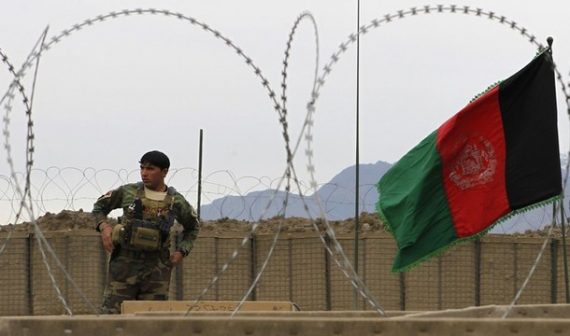

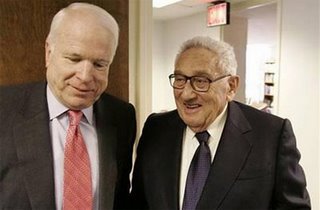
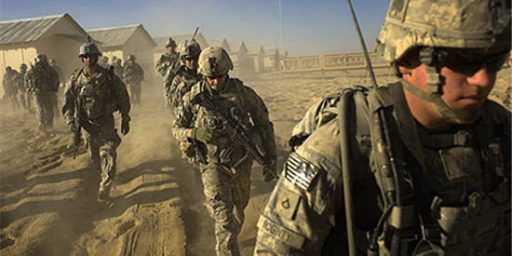

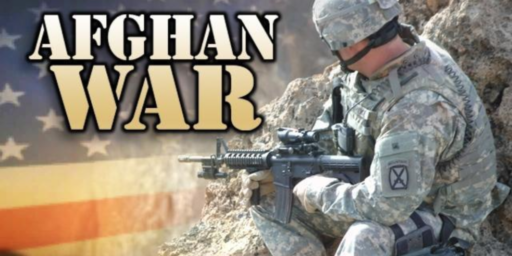
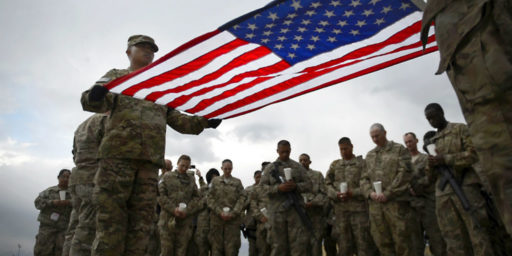
Does anyone really believe that the Afghans’ will ever be
able to effectively rule their own country? I think that
continuing to spend money and lives over their
is ludicrous. We cannot succeed in changing whole cultures
that have not accepted the idea of a government ruled
by “The People”. This culture has not really changed in
thousands of years. They are tribal in nature and will
continue to be so, until all the people rise up and take over.(If they ever do!)
WE CANNON FORCE THEM TO DO SO!!!.
I believe we have failed miserably in these types of
“Police Actions” since the end of WWII. Show me what
we have actually gained in Viet Nam, Iraq, and all the
other places in the world we have projected our
finances, lives, and democratic ideas.
Let them sort it out by themselves. We have more than
enough to take care of here at home!
Two other deficits that bear mentioning. Afghanistan does not have much in the way of military air capability for defense, attack, or reconnaissance. And Afghanistan does not have the economic ability to support a military capable of defending its own borders.
So, without help they basically have nothing. Not even an army since they can’t afford it on their own.
I enjoyed the piece James but I must say the title of the post seems to be at odds with your conclusion.
If indeed the obstacles are insurmountable is it realistic to continue tasking NATO with what seems to be impossible?
@Davebo: I didn’t give it the title but I’ve long argued that conclusion. I think it’s theoretically possible that the United States and its allies, given unlimited time and resources, could achieve their objectives in Afghanistan. Given that they don’t have unlimited time and resources–and it was never reasonable to think they would–the objectives are not achievable.
Thanks for the clarification James.
It’s long past time we eschew the theoretically possible solutions and concentrate on, at a minimum, the somewhat likely ones.
@James Joyner: But what are the allies objectives and do they mesh with Afghan’s objectives? To pacify a tribal wasteland? To what end?
Indeed, just about any analysis into Afghanistan seems awfully shortsighted of late. James, can you recommend any insightful reading anymore that takes in the bigger picture? No one talks about what really keeps the fires burning in Afghanistan anymore (Pushtunistan, Khalq v. Parcharmi, etc.)
The only way you pacify a place like Afghanistan is to go all Genghis Khan on them, start butchering villages and stacking skulls as warning.
This is not p.c. in the slightest but it gets attention.
I presume you were simply pointing out the lengths to which one would have to go in order pacify the people within Afghanistan, as anything short of outright genocide would be insufficient. I sincerely hope you were not advocating it as an acceptable policy.
i think phillip nailed it. to understand the afghan war, you need to understand pakistan and its politics. theres a serious lack of material in that regard.
What objectives should we pursue in Afghanistan? Given that the major withdrawal will take place, and that we (NATO) provide support at some level, what will be the goals of this vastly reduced military footprint, and how can we even protect that remaining force from being serially assassinated? To rely on the Afghan forces seems to be an iffy proposition, as they appear to be infiltrated with Taliban or AQ people, that pop up and shoot four, five, six or more of our men before they are taken out. With the major NATO forces gone, the opposition will become emboldened to execute even more serious attacks on the remainder. More IED’s, more suicide bombers and more ambushes are in store for us, until we pull out completely, it seems. I expect that the current government will be fractionated not long after our forces are out.
I am in agreement with those who say we should withdraw fully, and wish Karzai good luck. Politically and culturally we cannot transform the Afghan nation into something stable and democratic with reasonable resources and effort. It may be necessary to offer asylum to those who would be killed if they remain, just as we have done in our other overseas adventures.
Politically, this agreement that we need to withdraw fully will not be surfaced by the government (Obama) before the election, and some trumped up rationale for us to declare victory needs to be invented also to make it all seem palatable. I contend, however, that we will leave behind a nation in chaos for the Afghans to sort out for themselves.
So, what do you think our goals should be?
These people beat the Soviets. I give the U.S. military much higher marks in nearly every metric, but if anyone believes we’re willing to fill as many body bags as the Soviets were, well then… I guess we couldn’t learn that lesson.
What do Afghans want? A stable political system that does not directly interfere with their cultural system. Is this possible? We see ourselves how easily divided our own nation can become over cultural issues that bleed into the political narrative.
In fact, the entire larger discussion of how to deal with failed stated like Somalia or Mali is totally absent from the disreputable remnants of Neoconservatives. As evidence, apparently Mr Romney’s former-Bush-advisors think that “the Soviets” are pushing into the Arctic and threatening “Czecoslavakia”. Why does anyone listen who isn’t paid to belong to the Atlantic Council?
We seem quite competent, even outstanding, in the opening, but begin to falter seriously in the middle game, and haven’t a clue as to how to conduct an end game. Perhaps we shouldn’t play this game at all until and unless we know how it must be played all the way through successfully to checkmate and beyond, and at what cost in men and resources.
We just might have to recognize that we cannot force the players on the other side to play by our rules, nor most of the players on our own side either. Sometimes there is just no game we can or should play, not all the way through in any event.